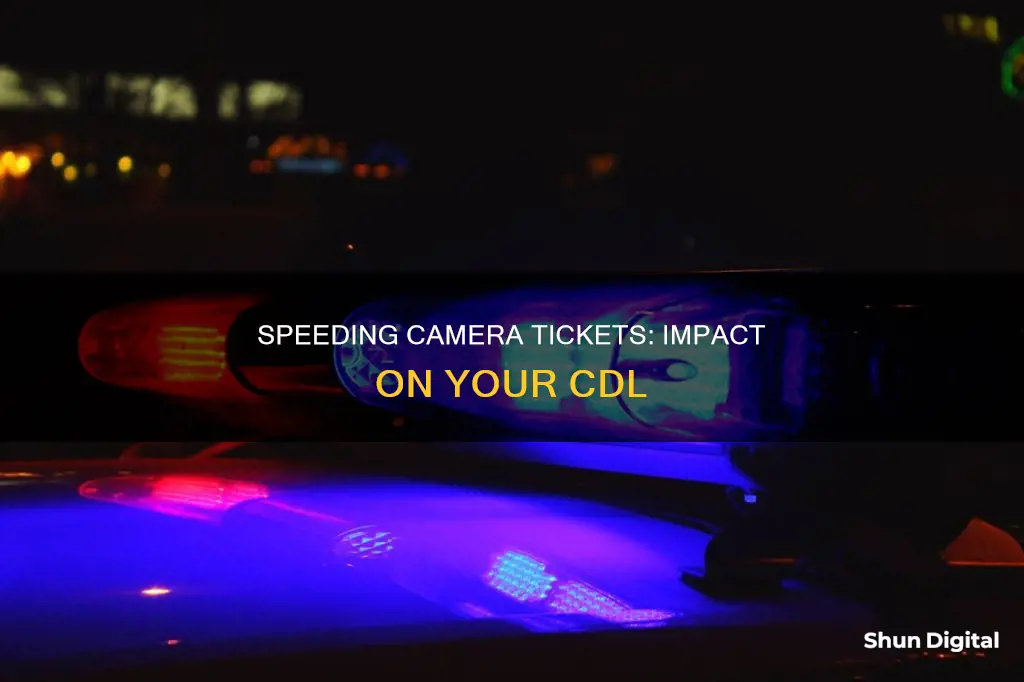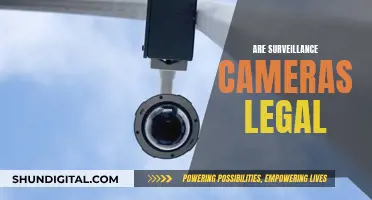
Commercial drivers are held to stricter rules and harsher penalties for traffic violations, including speeding. Generally, commercial drivers face more severe penalties for speeding violations only if they occur while operating a commercial vehicle. However, certain circumstances, such as speeding in Oregon, may result in CDL revocation even when driving a personal vehicle. Understanding the consequences of speeding violations and the impact on CDL privileges is crucial for commercial drivers.
What You'll Learn

Speeding in a personal vehicle vs. a commercial vehicle
Speeding in a personal vehicle is generally treated differently from speeding in a commercial vehicle. Commercial drivers are held to stricter rules and harsher penalties for traffic violations, including speeding. This is to ensure the safe operation of commercial vehicles.
Speeding in a Commercial Vehicle
Speeding in a commercial vehicle is considered a "serious traffic violation" if the driver is going at least 15 miles per hour over the speed limit. This will result in standard fines, fees, and demerit points, and will be recorded on the driver's record. Federal rules mandate a minimum 60-day CDL revocation for two serious traffic violations in three years and a minimum 120-day revocation for three or more offenses in the same period.
Some states, like California, impose harsher penalties for speeding in a commercial vehicle. In California, speeding at least 15 miles per hour over the limit in a commercial vehicle is a misdemeanor offense, carrying potential jail time and significant fines. Additionally, some states have specific speed laws for commercial vehicles carrying dangerous cargo or transporting passengers, such as school buses with children on board.
Speeding in a Personal Vehicle
Generally, a speeding ticket in a personal vehicle will not affect a driver's commercial driving privileges. However, there are a few exceptions. If a driver's license is suspended due to excessive demerit points or other reasons, their commercial driving privileges will also be revoked.
In some states, certain excessive speeding violations in a personal vehicle, such as driving 100 miles per hour or more, are considered serious violations and can lead to license suspension and the loss of commercial driving privileges. For example, in Oregon, speeding 30 miles per hour over the limit in a personal vehicle will result in mandatory license revocation and will be recorded as a serious traffic violation against the driver's CDL.
While speeding in a personal vehicle typically does not impact commercial driving privileges, it is important for commercial drivers to be aware of the specific laws and regulations in their state. Speeding in a commercial vehicle, on the other hand, carries more severe consequences and is treated as a serious traffic violation. Commercial drivers should be mindful of speed limits and adhere to safe driving practices to maintain their driving privileges.
Understanding Camera Raw's Slow Performance
You may want to see also

State laws on speeding violations
Basic Speed Limits
It is usually illegal to drive faster than what is considered reasonable for the current conditions. This "basic" or "fundamental" speed law is often applied when no speed limit is posted or when weather conditions require extra caution. For example, driving at 55 mph on a highway may be considered reasonable in perfect conditions, but the basic speed law would likely mandate slower speeds if it's dark and icy.
Maximum Speed Limits
Most states have "maximum" or "absolute" speed limits, which simply prohibit driving faster than a specified speed on a particular stretch of road. While states and cities typically post speed limit signs, there may be areas without signage where maximum speed limits still apply. In such cases, jurisdictions often have blanket speeding limits, such as a 30 mph limit in unposted areas. Driving above the maximum speed limit is a violation regardless of conditions or the driver's intent.
Per Se, Presumed, or Prima Facie Speed Limits
Some states employ "per se" (also known as "presumed" or "prima facie") speed limits, where a posted maximum speed exists, but drivers caught exceeding it can argue their case in court. They may be able to prove that their speed was safe given the prevailing conditions, and if the judge is convinced, the ticket will be dismissed.
State-Specific Laws
Each state has its own nuances in speeding laws and penalties. Here are some examples:
- California: California Vehicle Code Sections 22348-22366 include provisions for reasonable and prudent speed, maximum limits, and infractions.
- Texas: Texas Transportation Code Sections 545.351-545.365 cover reasonable and prudent speed, as well as speed limits. Misdemeanour speeding can result in fines up to $200.
- New York: In New York, speeding violations are categorised as traffic infractions, with fines ranging from $90 to $600 and potential suspension or revocation of driving privileges.
- Oregon: Oregon's speeding laws (ORS Section 4511.21) classify speeding as a misdemeanour, with fines ranging from $150 to $500 and potential suspension through a point system.
- Illinois: In Illinois, speeding 26 mph or more over the limit is a misdemeanour, punishable by up to six months in jail and up to $1,500 in fines.
Impact on Commercial Driver's Licenses (CDL)
The impact of speeding violations on CDLs depends on whether the violation occurred in a commercial motor vehicle (CMV) or a personal vehicle. CMV speeding violations that exceed the limit by 15 mph or more are generally considered "serious traffic violations" and can lead to CDL revocation. On the other hand, speeding in a personal vehicle typically does not affect CDL privileges unless it results in a suspension of all driving privileges.
Speco Cameras: Where Are They Manufactured?
You may want to see also

Demerit points and license suspension
Commercial drivers are held to stricter rules and harsher penalties for traffic violations. Demerit points and license suspension are a key part of this.
Demerit Points
In most states, there is a demerit point system for traffic violations. The number of points received depends on the severity of the violation. For example, in Michigan, speeding violations can result in one to four points, depending on how much the driver exceeded the speed limit. In Illinois, speeding offenses can carry 50 points if the driver exceeded the minimum speed limit by a large amount.
License Suspension
If a driver accumulates too many demerit points within a certain time period, they may face license suspension. For example, in California, a driver will face penalties after acquiring four points in 12 months, six points in 24 months, or eight points in 36 months. In Illinois, accumulating three or more traffic violation convictions within a 12-month period can result in license suspension.
Commercial Driver's License (CDL) Suspension
CDL holders face more severe consequences for speeding tickets than regular drivers. Generally, the consequences of a speeding ticket are more severe if the CDL holder was operating a commercial vehicle. In this case, exceeding the posted speed limit by 15 mph or more is considered a "serious traffic violation" in all states. A second serious violation within three years will result in a minimum 60-day CDL suspension. If a driver commits a third serious violation within three years, the CDL suspension increases to at least 120 days.
However, speeding in a personal vehicle as a CDL holder is treated differently. In this case, the driver will only lose their CDL privileges if they lose all driving privileges. Additionally, in some states, certain excessive speeding violations in a personal vehicle are considered serious violations, even if the driver was not in a commercial vehicle. For example, in Oregon, speeding 30 mph over the limit will result in mandatory revocation and will be recorded as a serious traffic violation.
iPad Camera: What Materials Make It?
You may want to see also

Serious traffic violations
Commercial drivers are held to stricter rules and harsher penalties for traffic violations than regular drivers. Even speeding tickets can lead to the loss of driving privileges. Generally, commercial drivers face more serious penalties for speeding violations only if the violations occur while operating a commercial (rather than a personal) vehicle.
The federal government has designated some traffic offenses as "serious traffic violations," which carry harsher penalties for CDL holders. Commercial drivers with two serious traffic violations within three years will face a minimum 60-day CDL revocation. A third violation within three years will result in a minimum 120-day revocation.
Under federal law, serious traffic violations include:
- Excessive speeding (usually 15 miles per hour or more over the speed limit)
- Improper lane changes
- Following too closely
- Reckless driving
- Distracted driving violations
- Driving a commercial motor vehicle (CMV) without the proper CDL in your possession
- Any traffic violation that results in a fatality
State-Specific Variations
While federal law applies to all states, individual states can and often do add violations to the list of serious traffic violations. For example, some states include failure to render aid (hit-and-run) and possessing alcohol in a CMV as serious violations.
Additionally, some states have specific CMV speed laws that increase the penalties for violations involving vehicles with dangerous cargo or transporting passengers, such as a school bus with children aboard.
Charging the Polaroid IS426 Camera: A Step-by-Step Guide
You may want to see also

Fighting a speeding ticket
Commercial drivers face stricter rules and harsher penalties for traffic violations, and even speeding tickets can lead to the loss of driving privileges. Generally, commercial drivers face more serious penalties for speeding violations only if the violations occur while operating a commercial (rather than a personal) vehicle.
If you are a commercial driver, it is important to understand the basics of speeding commercial driving violations, as the consequences of a speeding ticket can be more severe than for non-commercial drivers and may even lead to your Commercial Driver's License (CDL) being revoked.
Commercial Motor Vehicle Speeding Violations
Traffic violations that are considered "serious violations" often lead to CDL revocation. Exceeding the posted speed limit by 15 mph or more in a commercial motor vehicle (CMV) is categorised as a serious violation in all states. A second serious violation within three years of the first will result in a minimum 60-day CDL revocation, and a third serious violation within three years will result in a minimum 120-day revocation.
Personal Vehicle Speeding Violations
The rules for speeding in a personal vehicle are less strict for CDL holders. A speeding ticket in a personal vehicle will only lead to a revocation of CDL privileges if the driver loses all driving privileges. This can happen when a driver accumulates too many demerit points, which are assigned for speeding violations. In some states, speeding violations can also lead to license suspension regardless of the number of points accumulated.
Options for Fighting a Speeding Ticket
If you are a commercial driver who has received a speeding ticket, it is important to understand your options for fighting the ticket. Here are some things to consider:
- Consult an attorney: Talk to a traffic ticket attorney about your options for fighting the ticket. An attorney can advise you on the best course of action and help you understand the potential consequences.
- Know the exceptions: In certain states, such as Oregon, certain excessive speeding violations in a personal vehicle may still be considered serious violations.
- Understand the impact on your record: Speeding tickets in a CMV that qualify as serious violations will remain on your record for at least three years and may be visible to employers for longer.
- Be aware of the consequences: A CDL speeding ticket can have serious implications for your employment status, as fleet management companies pay close attention to a driver's speeding history.
Chicago Camera Tickets: What You Need to Pay
You may want to see also
Frequently asked questions
Operating a commercial motor vehicle (CMV) 15 miles per hour over the speed limit is considered a "serious traffic violation" and will lead to standard fines, fees, and demerit points.
Under federal law, a CDL holder with two serious traffic violations within three years will lose their CDL for at least 60 days. A third violation in three years will result in a minimum 120-day revocation.
Generally, a speeding ticket in a personal vehicle will not affect your CDL. However, if your license is suspended as a result of the speeding ticket, your CDL privileges will also be revoked.
The consequences of a speeding ticket are generally more severe if the CDL holder received the violation while operating a commercial vehicle. This may result in license demerit points and can lead to the suspension of commercial and personal driving privileges.
It is recommended to consult with a lawyer to discuss your options for fighting the ticket. Depending on the nature of the violation, your previous driving history, and the jurisdiction you were in, you may have a range of options that could result in the ticket not hitting your driving record.







